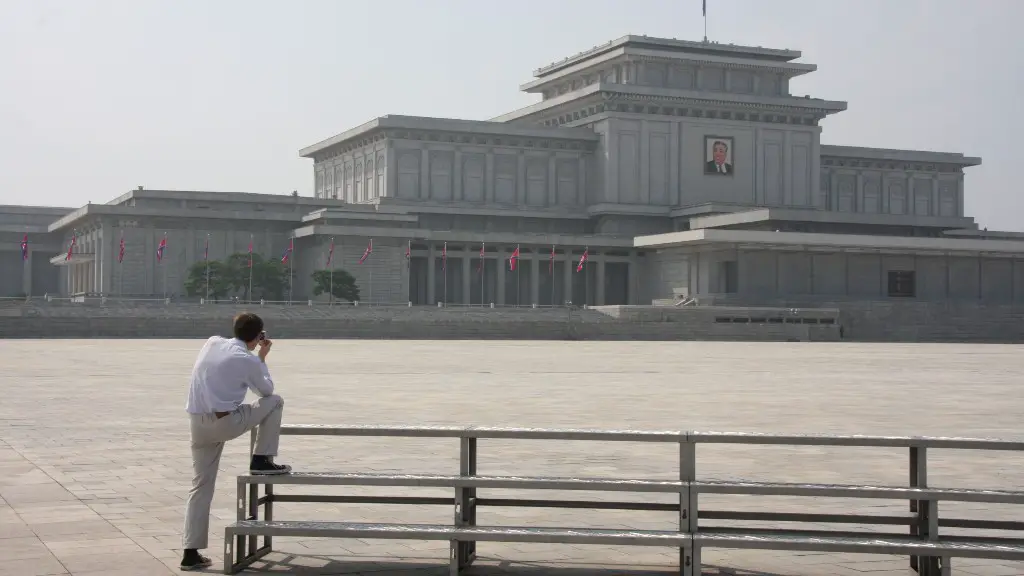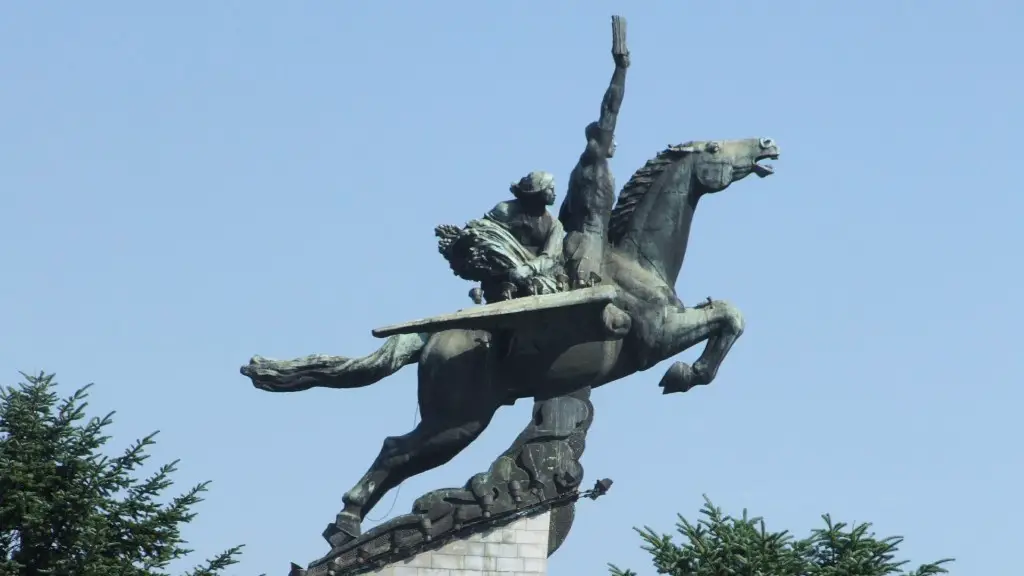North Korea has long been a source of international tension, particularly with the United States. North Korea’s isolation and its nuclear and ballistic missile program have raised particular concern. So why is North Korea mad at the United States?
North Korea has perceived the United States as an enemy since the end of the Korean War in 1953. During the Cold War, North Korea saw the United States as a major threat due to its influence over South Korea and its role in the region. North Korea also believes that the United States has sought to contain and undermine it, and it has had a long-standing policy of hostility towards American leadership.
At present, the relationship between North Korea and the United States is at a historic low. North Korea accuses the United States of taking simultaneous action, such as economic pressure and military exercises, which North Korea believes is an attempt to overthrow its regime. North Korea also sees the United States as having historically disregarded its security interests and countering its efforts to improve its economy and international relations. For example, North Korea blames the United States for the UN Security Council’s sanctions against it and its failure to follow through on its commitments during negotiations.
Moreover, North Korea perceives the United States as a military threat. North Korea condemns the United States’ so-called pivot to Asia and its military presence in the region, characterizing it as ”muscular policy.” It also views THAAD, a US-built missile defense system deployed in South Korea, as a direct threat to its security, as well as symbolic of American encroachment in the region. From North Korea’s perspective, US-led exercises are a threat and a provocation, as US forces are often accompanied by a nuclear-powered aircraft carrier and take place near the Korean peninsula.
Moreover, North Korea perceives the United States’ approach to negotiations as an ultimatum. North Korean leaders view the global non-proliferation and disarmament as inherently biased against them, and view the US approach as hostile and arbitrary. North Korea also accuses the United States of acting unilaterally and imposing maximalist demands that it is unable to accept. In short, North Korea views the US as an adversary, and distrusts US intentions.
North Korea’s Domestic Political Climate
North Korea’s domestic politics is key to understanding why it often perceives the US as an enemy. North Korea has been governed by authoritarian leaders for decades, who wield considerable power and rely on fear and intimidation to maintain their grip on power. This, in addition to a lack of a free press, has created a climate of paranoia and mistrust, in which North Korea sees outside powers, particularly the US, as a existential threat. Moreover, North Korea’s official ideology is one of ‘defensive nationalism’, which serves to frame North Korea’s actions as motivated primarily by self-defense and hatred of external powers.
The political culture also helps to explain North Korea’s reluctance to negotiate or make concessions. North Korea’s political elites face significant domestic pressure to uphold their hardline stance against the US and appear strong in the face of American aggression. Moreover, North Korea is driven by a deep-seated fear of US intervention and the risk of regime change. This means that North Korea does not view negotiations as an opportunity for compromise but rather as an occasion for confrontation. In short, North Korea’s domestic political environment makes it very difficult for it to make any meaningful concessions.
US-North Korea Relations
The US has long sought a peaceful resolution to the North Korean issue, but its efforts have largely been unsuccessful. Despite US efforts, North Korea views US policy as hostile and has refused to make any meaningful concessions. Over the past few years, the US has sought to increase pressure on North Korea in the form of sanctions and military exercises, but North Korea has been largely unmoved. In recent years, the US has pursued a more diplomatic approach, and President Trump has met with North Korean leader Kim Jong Un several times in an effort to normalize US-North Korea relations. However, much of this diplomatic effort has been unsuccessful, as Kim Jong Un has refused to make meaningful concessions. The US is eager for North Korea to make tangible progress on denuclearization, but North Korea has been reluctant to comply.
Potential Path Forward
Given North Korea’s deep-seated mistrust of the US, it is unlikely that a lasting peace between the two countries can be achieved without significant changes in North Korea’s political system. North Korea may eventually have to accept the fact that the US is not a direct threat to its security, and that an improved relationship could lead to better economic conditions for its citizens. However, any such change is likely to be slow, and it is not clear if North Korea’s political system can fundamentally shift to accept US engagement.
In the meantime, the US should focus on engagement, not confrontation. The US should continue to pursue a diplomatic approach, as this is more likely to lead to meaningful progress than a policy of coercion. The US should also be willing to make meaningful concessions, such as providing economic assistance and removing sanctions, in exchange for meaningful denuclearization steps. Ultimately, the path to peace between the US and North Korea is likely to be long and arduous, but the US should continue to pursue a diplomatic approach in order to avoid a disastrous conflict.
North Korea’s Perspective on Security
The security of North Korea is a major concern for its leaders and a significant factor in North Korea’s mistrust of the United States. North Korea is a small and isolated country surrounded by powerful nations, and it is deeply concerned about the possibility of foreign interference. North Korean leaders view the United States’ military presence in the Asia-Pacific region as provocative and believe that the US is seeking to encircle the country and undermine its leadership. North Korea also believes that any security agreement reached with the US would not be effective or enforceable, as the US has a history of reneging on its commitments and making unilateral demands.
North Korea also fears US attempts at regime change, as the US has a long history of attempting to overthrow governments it perceives as hostile or oppressive. North Korean leaders also view any US-backed attempt at regime change as a direct threat to their own power. As such, North Korea is unlikely to agree to negotiate on its nuclear or missile programs unless it is certain that the US is committed to avoiding military action or regime change.
Impact of Sanctions on North Korea
The US has long imposed economic sanctions in an effort to compel North Korea to abandon its nuclear weapons program. US-led sanctions have had a significant economic impact on North Korea and have created hardships for its citizens. Sanctions have been effective at limiting North Korea’s access to international markets and increasing economic pressure on its leadership. However, economic hardship has increased public support for the regime and reinforced North Korea’s distrust of the US.
Moreover, US-led sanctions have also had an important political impact on North Korea. Sanctions have further isolated the country from the international community and hindered its ability to engage in meaningful negotiations with the US. North Korea is also wary of any agreement with the US, as it fears that the US will renege on its commitments or significantly escalate sanctions if North Korea fails to comply with the agreement. Sanctions have also deepened North Korea’s paranoia and distrust of the US, making it more reluctant to make concessions.
US Role in Regional Security
The United States is a major player in regional security, and its actions have a significant impact on North Korea. US policy in the Asia-Pacific region has been the subject of much debate, and the US is often portrayed as an aggressor and a threat to regional peace. North Korea in particular views US policy as threatening, and believes that US efforts to bolster regional security are actually aimed at containing and undermining it. North Korea has long sought to counter US influence in the region, and its mistrust of the US and its intentions has frequently been a major obstacle to negotiations.
To address North Korea’s concerns, the US should pursue a more collaborative approach to regional security. Rather than pursuing a policy of confrontation, the US should instead seek to work with North Korea and its neighbors to ensure collective security in the region. The US should also advocate for the peaceful resolution of disputes and support the establishment of effective institutions to manage regional tensions. Ultimately, a collaborative approach to regional security would reduce mistrust and create an environment in which negotiations can progress.
Conclusion
North Korea’s long-standing mistrust of the United States is a major obstacle to improving US-North Korea relations. North Korea views the US as an adversary and a threat to its security, and it distrusts US intentions. The US has sought to improve relations through economic pressure and diplomatic engagement, but North Korea has largely rejected US efforts. North Korea’s domestic political climate has played an important role in its mistrust of the US, and US-led sanctions have deepened North Korea’s paranoia. To address this issue, the US should pursue a more collaborative approach to regional security, as well as make meaningful concessions in exchange for meaningful denuclearization steps.




